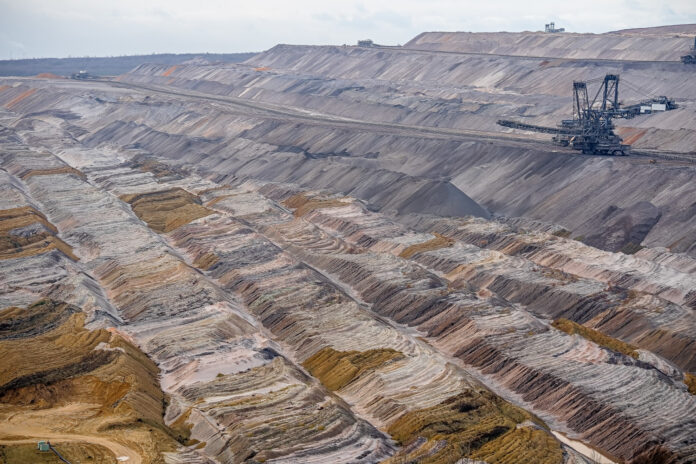Nearly half of mining executives prioritise AI-driven tech investments for decarbonisation, focusing on sustainability and efficiency
As global industries shift towards sustainable practices, the mining sector is making significant progress in adopting AI and advanced technologies to meet decarbonisation targets. According to KPMG’s 2024 Global Metals and Mining Outlook, the industry is intensifying its focus on emissions reduction and digital transformation, with 55% of sector leaders prioritising AI-driven initiatives to cut carbon footprints over the next five years.
The report, which surveyed over 450 C-level executives worldwide, underscores a clear shift in strategy, driven by the need to balance sustainability with operational efficiency. A major highlight of the findings is the increasing reliance on artificial intelligence (AI) and advanced analytics, with 43% of respondents identifying AI as a crucial tool in tackling strategic challenges such as optimising production processes and reducing environmental impact.
Bob Wilt, CEO of Saudi Arabia’s national mining giant Ma’aden, emphasised the transformative potential of technology, stating: “The timeline from exploration to commissioning a mine has been dramatically reduced — from sixteen years to just nine — thanks to advancements in AI and data analytics.” This acceleration is crucial for meeting the growing global demand for essential minerals, especially as the world shifts towards greener energy sources.
The mining sector’s focus on decarbonisation is not limited to cutting emissions. Companies are also redesigning operations and electrifying mining machinery, contributing to significant environmental and economic benefits. In an industry historically known for its high carbon output, the integration of AI to streamline operations and enhance sustainability represents a seismic shift towards a greener future.
Technological Advancements Driving Sustainability
Sammy Ahmed, KPMG’s partner and head of energy and natural resources for Europe, the Middle East, and Africa, believes that the sector is at a critical juncture. He said, “The metals and mining industry stands at a pivotal crossroads, where decarbonisation, geopolitical shifts, and technology, including AI, are reshaping the path to resilience and growth.” Integrating sustainable practices with digital transformation, he added, provides a strategic edge, ensuring long-term success and resilience against market fluctuations.
One of the key findings of the report is that 43% of companies are already using AI to monitor and manage their carbon footprints. This includes deploying AI-driven key performance indicators (KPIs) to track emissions and identify areas for improvement. The increased use of predictive analytics also helps firms stay ahead of regulatory changes, with 56% of executives noting that AI plays a crucial role in managing compliance risks.
Addressing Workforce Challenges and Skills Gaps
However, even as the industry embraces digital tools, it faces a pressing challenge: a shortage of skilled tech talent. Nearly half (47%) of mining executives report difficulties in hiring employees with the necessary technological expertise. To bridge this gap, companies are investing in upskilling initiatives and forming partnerships with educational institutions to attract talent from technology and renewable energy fields.
Farhan Muhammad, KPMG’s director of metals and mining in Saudi Arabia, noted that global trends in digital innovation for sustainability are being effectively implemented within the Kingdom. “The use of AI, decarbonisation strategies, and efforts to enhance operational efficiency are gaining traction in Saudi Arabia with promising outcomes,” he said.
Navigating Economic Volatility and Supply Chain Disruptions
Despite the optimism around tech-driven decarbonisation, the industry remains cautious in the face of economic challenges. The KPMG report highlights ongoing concerns about price volatility and supply chain disruptions. A significant 66% of executives cited increased output price fluctuations due to geopolitical instability, as well as surging demand for critical minerals like lithium, copper, and nickel — essential components for renewable energy technologies.
Yet, there is a prevailing sense of confidence in the sector’s future growth. Approximately 61% of industry leaders expressed optimism about their companies’ prospects over the next two years, with many firms exploring new markets and strategic partnerships to strengthen supply chains. About 58% have already begun investing in these areas to mitigate risks and capitalise on new opportunities.
Regulatory Compliance and Emissions Management
Regulatory compliance continues to be a major area of focus, particularly concerning emissions. One-third of the executives surveyed identified Scope 1 and 2 emissions as significant regulatory challenges, while 30% cited Scope 3 emissions as an area requiring more attention. The integration of AI to anticipate regulatory changes and streamline compliance processes has been instrumental, in helping firms stay proactive in a complex regulatory landscape.
The adoption of AI not only enhances compliance but also strengthens companies’ resilience against sudden regulatory shifts. As industries worldwide face increasing pressure to meet stringent environmental standards, the mining sector’s proactive approach could set a precedent for others to follow.
Looking Forward
As the global push for sustainability intensifies, the metals and mining sector appears poised to play a key role in the transition to a low-carbon economy. By investing in AI, automation, and digital transformation, companies are not only reducing their environmental impact but also positioning themselves for long-term growth in an evolving market.
The path forward may be challenging, particularly with workforce gaps and economic uncertainties, but the sector’s embrace of technology and sustainable practices suggests that mining companies are ready to adapt and thrive. As the Kingdom of Saudi Arabia continues to push its Vision 2030 agenda, initiatives like these will be vital in achieving national economic diversification goals and cementing its position as a leader in sustainable industrial development.
